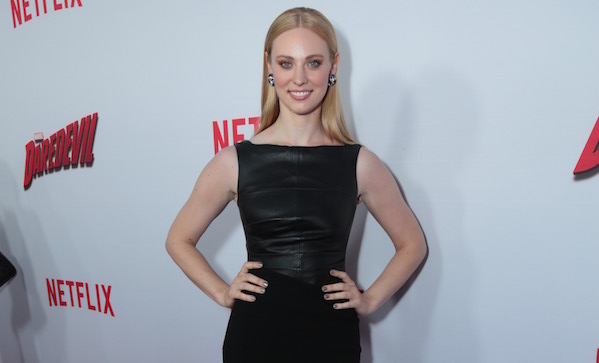Matt Murdock may have special powers, transforming himself into a so-called superhero, but that doesn’t mean those around him aren’t brave and valorous too. Murdock (Charlie Cox) is the titular lawyer-by-day, vigilante-by-night in Netflix’s gritty original series Marvel’s Daredevil, but the female characters are not to be overlooked. Case in point: Karen Page, a young woman who finds herself face to face with the danger, suffering, and corruption teeming in this vision of Manhattan.
“This is a violent world that these people live in, at least for Karen and Claire (Rosario Dawson); they are aware of this violence and still walk into it,” says actress Deborah Ann Woll, who plays Ms. Page. Woll came to Toronto to speak about the show, an opportunity that presented itself as rather creatively similar to her work on HBO’s True Blood, but one that also made her slightly wary.
“The double standard I was scared about with this show was that if Karen walked down a dark alleyway in search of truth, they would call her an idiot, and if Matt walked down a dark alleyway in search of truth, they would call him a hero,” says Woll. “And that’s the kind of double standard that scares me.”
“Karen is not a moron. She is ridiculously brave because she can’t throw a punch like Matt can, but it’s not going to stop her. To me, that is not a damsel in distress. That’s a hero.”
While brave, she does endure a fair amount of physical abuse, as does Claire and a handful of female bystanders. Daredevil has earned apt critical and public praise, though what is perhaps most striking about the show is just how dark, violent, exhausting it can be—which isn’t necessarily a bad thing. At the same time, it’s kinetically beautiful too, with action sequences that draw comparisons to The Raid and The Bourne Identity.
It’s the women getting violently hurt that may (should?) cause pause for viewers, though.
“The problem would be if the men all fight and come out without a scratch and the women are just being abused,” counters Woll, pointing out that Murdock certainly gets knocks around a lot (knocked out, stabbed, thrown from windows, et cetera), as do the many henchman of the villain Fisk (Vincent D’onofrio). The visceral nature of the violence makes Daredevil both compelling and chilling.
Woll wouldn’t have enlisted if Karen was simply a character that reacted based on the men around her instead of being her own person. She is not merely a love interest; she is not solely a secretary. And Woll did not want to be a damsel.
“When you sign on to a series, you don’t have any control of your character. You hope you inspire certain directions, but the writers are going to write what they choose,” explains Woll, who only really knew the outline of a couple episodes before joining. She talked to the producers beforehand to ensure that Karen wouldn’t simply be a caricature or stereotype. “I just wanted to be sure they treated her fairly. They told me a sort of rundown over the first season and an interesting storyline. I knew she was in good hands. My original fear went away.”
Were Karen not a layered character and instead just a love interest for helpless bystander, Woll would have passed. There is more to Karen (and Matt, and others) than the first episode or two give away.
“I liked that she was flawed,” says Woll. “She’s not the perfect idea of a woman; she’s a very perplexed person with challenges, some of which are self-inflicted.”
With creative storytelling, thoughtful character development, and plenty of authentic action, Daredevil looks to be the latest in a successful line of original programming by Netflix. Still, this dark Marvel show from Drew Goddard is more a crime drama than anything else, unique for Netflix and indeed much of television. And it’s not just about the title man.
“I hope what is coming across in the show is that these are two very brave women who will put themselves at risk just like someone else,” says Woll of Karen and Dawson’s Claire, who finds nurses Matt back to health one dangerous night. “I don’t feel violence is against women just because they are women. These women are getting into violent situations because they are brave.”
Anthony Marcusa is a Toronto-based freelance journalist whose writing dabbles in film, TV, music, sports, and relationships – though not necessarily in that order. He’s simultaneously youthfully idealistic and curmudgeonly cynical. You can follow him on Twitter @MrAnthonyWrites.


